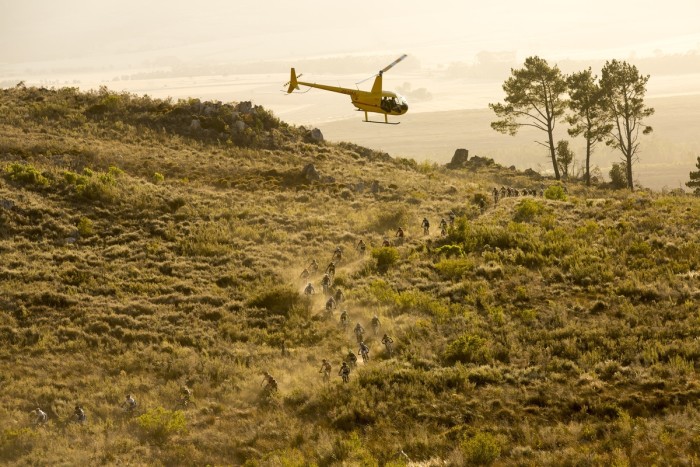Earlier this week the Absa Cape Epic announced that two ex-professional road cyclists would be participating in the 2017 event. Tour de France winner Cadel Evans would be teaming up with George Hincapie, riding for BMC in the Masters category.
On the face of it, this is another happy story about ex-professionals passing their media cache on to a mountain bike event. Sure, Cadel started out as a mountain biker, and a very successful one at that, but he is best known for his achievements on the road. Road cycling is much, much bigger sport than mountain biking, and is locked in to various national broadcasts around the globe. The Cape Epic achieves an amazing reach globally, but bringing in major road cycling celebrities like Evans or Hincapie can only boost the profile.
(c)Tim De Waele
There was a a hiccup though. In late 2012, the Cape Epic had announced a ruling that appeared to be a zero tolerance policy against convicted dopers. Their stance, was described by race founder Kevin Vermaak as follows:
“As of 1 January 2013, any athlete (professional or amateur) caught using performance enhancing substances, whether at another event or out of competition, will be banned for life from participating in the Absa Cape Epic. Not only will the person not be allowed to participate (as an amateur rider or UCI- licensed elite), but the individual will also be banned from being involved on any level including as a team manager.”
Of note, Vermaak stated that the rules would not be applied retrospectively, claiming it would be ‘naive’ due to the dark past of cycling.
George Hincapie confessed to doping in his career in 2012, as part of evidence against Lance Armstrong. He also stated he has raced clean since 2006. Many feel that it still portrays the wrong image, having him at the event as a VIP. Many would also argue that the benefits of drug use go beyond a few days, weeks or months – they could last decades.
In this instance, the debate is more about the ethics of the decision. Should a race that has taken a firm stance on dopers in sport willingly accept riders from a dark era? Does mountain biking need the pull of road cycling for continued growth? Should we be happy to have the extra exposure for the sport, even if it goes against much of mountain biking’s ethics and the Cape Epic’s apparent position?
Direct responses from the Cape Epic
We contacted the Cape Epic’s media team to ask how both Evan’s and Hincapie’s participation would benefit the race, and what they thought about feedback from the mountain bike community.
MMTB: How did the concept of Hincapie joining Evans for the Cape Epic come about?
Cape Epic: The Cape Epic has been speaking to Cadel’s management about his participation for a few years already. He was unfortunately unable to ride in 2016 because of his knee operation but decided to do so in 2017. As we understand it, George has been a close friend of Cadel’s since they both joined BMC Racing, and George was Cadel’s first and obvious choice for partner when Cadel got serious about his Epic participation.
MMTB: There’s been a lot of discussion amongst the mountain biking community about whether or not Hincapie should be allowed to race given his admission of doping during his road racing career. Was this ever considered when his participation in the race was being planned?
Cape Epic: “The Cape Epic has its own set of rules regarding doping that are somewhat stricter than WADA and many other bike races and sporting codes. This was particularly true when we introduced our life-time ban policy in November 2012.
The relevant section is: 28.3 Any person who is under provisional or final sanction by an Anti-Doping Organisation with jurisdiction under the WADA Code (a “person under sanction”) is prohibited from participating or being involved in the race, whether as a rider, team manager or official or in any other capacity whatsoever. Where any such sanction has been made final for an offence committed after 31 December 2012, such prohibition shall apply for the life of the person under sanction (irrespective of the duration of the sanction imposed by the relevant Anti-Doping Organisation).”
As stated by Kevin Vermaark, along with his statement listed above:
“This is harsher than what is required currently by any federation, but is our considered opinion of what should be enforced even on a wider scale with regards to event participation of convicted dope cheats.”
“We’ve chosen not to apply this retrospectively because we believe that would be naive. As has been exposed in recent months, cycling has a dark past. Many riders from this previous era have rediscovered the joy of cycling as mountain bikers and participate in the Absa Cape Epic as their expression of riding clean. Previous offenders, who have served their suspension term, may ride future Absa Cape Epics. We want to be part of the new era of cleaner cycling, and therefore only future offenders will receive the lifetime bans.”
The Cape Epic feel that “In terms of both the spirit and the letter of our rules Hincapie qualifies to participate.”
MMTB: We’ve noted the conversation you’ve had with fans of the race on Facebook, and while the changes in regulations allow Hincapie to compete, is it not understandable that people are expressing disappointment in what appears to be backtracking on the “zero tolerance” policy?
Cape Epic: “The change in the wording of the regulations was done in January of this year on legal advice – the previous version was not consistent with the race’s intentions re: no retrospective punishment. It was not done to allow any individual to take part, but to have the ruling consistent with our original intentions. See also Kevin Vermaak’s Facebook post here:
MMTB: Given the strong message the “zero tolerance” policy, and the positive response to it from the mountain biking community, do you feel that the benefits of Hincapie’s participation outweigh the benefits of a very black and white anti-doping stance?
Cape Epic: “In terms of our rules we cannot prevent somebody convicted of a doping offence before Jan 1, 2013, from taking part in the Cape Epic. See also Kevin’s post on this topic. There is precedence; George is not the first former-pro road cyclist convicted for doping that has participated in Cape Epic’s since our life-time ban policy was introduced. We have not compromised one iota from our stance.”
And this is true, the Cape Epic did allow Roel Paulissen to race the Cape Epic, even though he’s had his own doping ban. But that is before their ruling, so technically not an issue.
Paulissen has been racing again for a few years.
How does the Cape Epic’s response sit?
So we’re left to make our own decisions, based on moral values. The Cape Epic can justify their stance within their rules, with the line in the sand that they drew at 1st January 2013. But is that enough? Does it truly promote moving forward with a clean sport, and only championing those who have received their accolades as clean riders, and not robbed others’?
Some professional riders do not agree with the Cape Epic, and voiced their concerns in to a post we put on our Facebook page.
Daniel Gathof said:
“It’s all about money and PR. No dopers was a strong message, but looks that creating coverage and a market is more important. I like the guys, they entertained me when they did road racing, I like the brand but rule is rule and MTB is MTB!”
Cory Wallace had a similar feeling, and commented:
“It’s bullshit. They should stick to their word. Dopers are liars and belong in jail for all the money and fame they steal from clean hard working athletes.”
And that’s hard to argue against. These are true quotes from riders who have had to race against drug cheats, albeit it mostly in mountain biking. Their actions do take accolades, income and pride from clean racers. The result of their actions go far beyond what you might consider. Put bluntly, they can put people out of a job.
So where do you stand? Is Hincapie a character of the sport who will bring extra exposure to mountain biking for growth of the sport, or does it bring a tainted name from one discipline of cycling, only to tarnish the reputation of another? It’s not a clear-cut scenario, and one that is likely to get caught up in personal interpretations of rules that have been created around general moral standpoints, but defended on technicalities and semantics.

